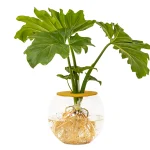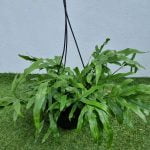Showing 601–612 of 2529 resultsSorted by popularity
-
Sale!

Fishbowl with Philodendron Selloum
R299.99 – R329.99Select options This product has multiple variants. The options may be chosen on the product pageFishbowl with Philodendron Selloum
How to make these vases thrive
Make sure roots are covered in water. Roots only! Do not keep the green stems in water at all as these will damage and kill the plant.
Natural light is perfect for them and keep out of direct sunlight to prevent browning leaves.Change water every 2 weeks and if wanting to feed, feed with liquid fertiliser once a month. We use Pokon liquid foods on our vases (half a tsp each month in the water)
-
Sale!

Fishbowl with Love Palm 10cm
All Indoor Plants, All Plants, Indoor Plants On Sale, Other Indoor Plants, Vase Range On Sale, Vases and more....Original price was: R550.00.R259.99Current price is: R259.99.Add to cartFishbowl with Love Palm 10cm
How to make these vases thrive
Make sure roots are covered in water and you can also cover some of the green stems in water too.
Natural light is perfect for them and keep out of direct sunlight to prevent browning leaves.
Change water every 2 weeks and if wanting to feed, feed with liquid fertiliser once a month. We use Pokon liquid foods on our vases (half a tsp each month in the water)
-

-
Sale!

Microsorum ‘Kangaroo Fern’ 20cm Hanging Basket
Original price was: R245.00.R159.99Current price is: R159.99.Add to cartMicrosorum ‘Kangaroo Fern’ 20cm Hanging Basket
Microsorum ‘Kangaroo Fern’ is a cultivar of Microsorum diversifolium, a species of fern native to Australia and New Zealand.
Foliage
Microsorum ‘Kangaroo Fern’ is named for its uniquely shaped fronds, which resemble the ears of a kangaroo. The fronds are leathery and dark green, with a glossy texture. They typically grow upright and can reach lengths of up to 2 feet.Growth habit
This fern has a clumping growth habit, sending up multiple fronds from a central rhizome. It tends to grow relatively slowly compared to some other fern species, making it well-suited for container cultivation.Light
Microsorum ‘Kangaroo Fern’ prefers bright, indirect light. It can tolerate lower light conditions but may not grow as vigorously or produce as many fronds in dimmer environments. Avoid direct sunlight, as it can scorch the leaves.Watering
Keep the soil consistently moist but not waterlogged. Water when the top inch or so of the soil feels dry to the touch, and water thoroughly, allowing excess water to drain away. Avoid letting the soil dry out completely, as this can cause the fronds to wilt.Temperature and humidity
Microsorum ‘Kangaroo Fern’ thrives in warm temperatures between 18°C to 24°C and appreciates moderate to high humidity. If the air in your home is dry, you can increase humidity by misting the fronds, placing the plant on a humidity tray, or using a humidifier.Soil
Plant Microsorum ‘Kangaroo Fern’ in a well-draining potting mix formulated for ferns or general indoor plants. A mix of peat moss, perlite, and bark or composted organic matter works well.Fertilising
Feed Microsorum ‘Kangaroo Fern’ every 4-6 weeks during the growing season (spring and summer) with a balanced liquid fertiliser diluted to half strength. Reduce or stop fertilising during the fall and winter months when growth slows down.Pruning
Remove any yellowing or dead fronds as needed to maintain the plant’s appearance. You can also trim back any overly long fronds to encourage bushier growth.Microsorum ‘Kangaroo Fern’ is a beautiful and unique fern variety that can add a touch of tropical elegance to your indoor space with proper care.
-
Sale!

Senecio Herreianus Purple Flush 21cm Hanging Basket
Original price was: R185.00.R155.00Current price is: R155.00.Add to cartSenecio Herreianus Purple Flush 21cm Hanging Basket
Common Name: String of bananas purple flush -
Sale!

Carnival Red Leucospermum (pincushion) 15cm Pot
All Plants, Full Sun Plants, Leucospermum Plants (Pincushions), Small Plants On Sale, Water Wise PlantsOriginal price was: R195.00.R139.99Current price is: R139.99.Add to cartCarnival Red Leucospermum (pincushion) 15cm Pot
Full Sun
Waterwise
Drought tolerant
Low Watering
Wind Tolerant -
Sale!

Agathosma Wilderness White 15cm Pot
Original price was: R120.00.R79.99Current price is: R79.99.Add to cartAgathosma Wilderness White 15cm Pot
Common Name: Wilderness White BuchuFull Sun
Semi Shade
Low Watering
Drought Tolerant -

-
Sale!

Cyrtomium Fortunei Clivicola 14cm Pot
Original price was: R155.00.R99.99Current price is: R99.99.Add to cartCyrtomium Fortunei Clivicola 14cm Pot
Common Name: Japanese Holly FernBright Indirect Light
Morning Sun
Medium Watering
Feed Monthly (feed every second month in winter)Cyrtomium fortunei, commonly known as the Fortune’s Holly Fern, which is a well-known and widely cultivated fern species.
Appearance: Cyrtomium fortunei is an evergreen fern with glossy, leathery fronds. The fronds are typically pinnate, meaning they have multiple leaflets arranged along a central axis. The leaflets are dark green and have serrated edges. The fronds can grow to be around 30 to 90cm in length, depending on the specific variety.
Growth habit: This fern has an upright and clumping growth habit. It produces a rosette of fronds that arise from a central rhizome. Over time, the fern can gradually spread by producing new fronds and rhizomes, forming a dense clump.
Light and temperature: Cyrtomium fortunei thrives in partial shade to full shade conditions. It can tolerate a wide range of temperatures but generally prefers cool to moderate climates.
Watering and humidity: The fern prefers consistently moist but well-draining soil. It should be watered regularly to keep the soil evenly moist, especially during dry periods. However, it is important to avoid waterlogged conditions. It can tolerate average indoor humidity levels but appreciates higher humidity levels.
Soil and fertilisation: Plant Cyrtomium fortunei in well-draining soil that retains some moisture. A mix of peat moss, perlite, and other organic matter can provide the ideal growing conditions. Fertilise the fern with a balanced houseplant fertiliser at a diluted strength every two to four weeks during the growing season (spring to summer) to provide necessary nutrients.
Care tips: Remove any dead or damaged fronds regularly to maintain the fern’s appearance. Mulching around the base of the plant can help retain moisture and regulate soil temperature. Cyrtomium fortunei is generally low-maintenance once established. It can tolerate a range of conditions but prefers a relatively stable environment.
-
Sale!

Spring Onion 6 Pack Tray
Original price was: R60.00.R49.99Current price is: R49.99.Add to cartSpring Onion 6 Pack Tray
Growing your own vegetables offers numerous benefits, both for your health and overall well-being. Here are some of the key advantages of cultivating your own vegetables:
1. Nutritional Value: Homegrown vegetables are incredibly fresh and packed with essential nutrients. They are harvested at their peak, ensuring optimal nutritional value. You have control over the cultivation methods, allowing you to avoid pesticides or other harmful chemicals.
2. Health and Wellness: Consuming homegrown vegetables promotes a healthier lifestyle. They are typically richer in vitamins, minerals, and antioxidants, which can boost your immune system, improve digestion, and lower the risk of chronic diseases such as heart disease and certain cancers.
3. Cost Savings: Growing your own vegetables can save you money in the long run. The initial investment in plants, soil, and tools may be modest, and the ongoing expenses are significantly lower compared to purchasing fresh produce from the market. Plus, you can grow a variety of vegetables at a fraction of the cost of buying them.
4. Taste and Flavour: Homegrown vegetables often have superior taste and flavour compared to store-bought produce. You can pick them at the peak of ripeness, allowing you to savour the true essence of each vegetable. The freshness and flavours of your homegrown vegetables can enhance your culinary experiences.
5. Environmental Sustainability: Cultivating your own vegetables promotes sustainable practices. By growing your food locally, you reduce the carbon footprint associated with long-distance transportation, packaging waste, and the use of harmful chemicals. Additionally, you can compost kitchen scraps and organic waste, minimizing landfill contributions.
6. Physical Activity and Stress Relief: Gardening is an excellent form of physical activity. It involves various tasks like digging, planting, weeding, and harvesting, which can provide exercise for your body. Engaging in gardening activities can also be therapeutic, reducing stress, anxiety, and promoting relaxation.
7. Educational and Skill Development: Growing your own vegetables offers a valuable learning experience for both children and adults. It allows you to understand the importance of sustainable agriculture, appreciate the effort involved in food production, and gain knowledge about plant biology and gardening techniques. It can also encourage a sense of responsibility and patience.
8. Food Security: Having your own vegetable garden contributes to food security. It provides you with a reliable source of fresh produce, reducing dependence on external suppliers. In times of emergencies or disruptions in the food supply chain, you can rely on the sustenance from your homegrown vegetables.
9. Aesthetics and Connection with Nature: Growing vegetables adds beauty to your surroundings. A well-maintained garden can enhance the aesthetics of your home and create a peaceful environment. It allows you to reconnect with nature, appreciate the seasons, and gain a sense of accomplishment.
Overall, growing your own vegetables offers a multitude of benefits, including improved nutrition, cost savings, environmental sustainability, physical activity, and a deeper connection with nature. It’s a rewarding endeavour that can positively impact your health, well-being, and overall quality of life.
-
Sale!

Spinach Swiss Chard 6 Pack Tray
Original price was: R60.00.R49.99Current price is: R49.99.Add to cartSpinach Swiss Chard 6 Pack Tray
Growing your own vegetables offers numerous benefits, both for your health and overall well-being. Here are some of the key advantages of cultivating your own vegetables:
1. Nutritional Value: Homegrown vegetables are incredibly fresh and packed with essential nutrients. They are harvested at their peak, ensuring optimal nutritional value. You have control over the cultivation methods, allowing you to avoid pesticides or other harmful chemicals.
2. Health and Wellness: Consuming homegrown vegetables promotes a healthier lifestyle. They are typically richer in vitamins, minerals, and antioxidants, which can boost your immune system, improve digestion, and lower the risk of chronic diseases such as heart disease and certain cancers.
3. Cost Savings: Growing your own vegetables can save you money in the long run. The initial investment in plants, soil, and tools may be modest, and the ongoing expenses are significantly lower compared to purchasing fresh produce from the market. Plus, you can grow a variety of vegetables at a fraction of the cost of buying them.
4. Taste and Flavour: Homegrown vegetables often have superior taste and flavour compared to store-bought produce. You can pick them at the peak of ripeness, allowing you to savour the true essence of each vegetable. The freshness and flavours of your homegrown vegetables can enhance your culinary experiences.
5. Environmental Sustainability: Cultivating your own vegetables promotes sustainable practices. By growing your food locally, you reduce the carbon footprint associated with long-distance transportation, packaging waste, and the use of harmful chemicals. Additionally, you can compost kitchen scraps and organic waste, minimizing landfill contributions.
6. Physical Activity and Stress Relief: Gardening is an excellent form of physical activity. It involves various tasks like digging, planting, weeding, and harvesting, which can provide exercise for your body. Engaging in gardening activities can also be therapeutic, reducing stress, anxiety, and promoting relaxation.
7. Educational and Skill Development: Growing your own vegetables offers a valuable learning experience for both children and adults. It allows you to understand the importance of sustainable agriculture, appreciate the effort involved in food production, and gain knowledge about plant biology and gardening techniques. It can also encourage a sense of responsibility and patience.
8. Food Security: Having your own vegetable garden contributes to food security. It provides you with a reliable source of fresh produce, reducing dependence on external suppliers. In times of emergencies or disruptions in the food supply chain, you can rely on the sustenance from your homegrown vegetables.
9. Aesthetics and Connection with Nature: Growing vegetables adds beauty to your surroundings. A well-maintained garden can enhance the aesthetics of your home and create a peaceful environment. It allows you to reconnect with nature, appreciate the seasons, and gain a sense of accomplishment.
Overall, growing your own vegetables offers a multitude of benefits, including improved nutrition, cost savings, environmental sustainability, physical activity, and a deeper connection with nature. It’s a rewarding endeavour that can positively impact your health, well-being, and overall quality of life.
-
Sale!

Radish 6 Pack Tray
Original price was: R60.00.R49.99Current price is: R49.99.Add to cartRadish 6 Pack Tray
Growing your own vegetables offers numerous benefits, both for your health and overall well-being. Here are some of the key advantages of cultivating your own vegetables:
1. Nutritional Value: Homegrown vegetables are incredibly fresh and packed with essential nutrients. They are harvested at their peak, ensuring optimal nutritional value. You have control over the cultivation methods, allowing you to avoid pesticides or other harmful chemicals.
2. Health and Wellness: Consuming homegrown vegetables promotes a healthier lifestyle. They are typically richer in vitamins, minerals, and antioxidants, which can boost your immune system, improve digestion, and lower the risk of chronic diseases such as heart disease and certain cancers.
3. Cost Savings: Growing your own vegetables can save you money in the long run. The initial investment in plants, soil, and tools may be modest, and the ongoing expenses are significantly lower compared to purchasing fresh produce from the market. Plus, you can grow a variety of vegetables at a fraction of the cost of buying them.
4. Taste and Flavour: Homegrown vegetables often have superior taste and flavour compared to store-bought produce. You can pick them at the peak of ripeness, allowing you to savour the true essence of each vegetable. The freshness and flavours of your homegrown vegetables can enhance your culinary experiences.
5. Environmental Sustainability: Cultivating your own vegetables promotes sustainable practices. By growing your food locally, you reduce the carbon footprint associated with long-distance transportation, packaging waste, and the use of harmful chemicals. Additionally, you can compost kitchen scraps and organic waste, minimizing landfill contributions.
6. Physical Activity and Stress Relief: Gardening is an excellent form of physical activity. It involves various tasks like digging, planting, weeding, and harvesting, which can provide exercise for your body. Engaging in gardening activities can also be therapeutic, reducing stress, anxiety, and promoting relaxation.
7. Educational and Skill Development: Growing your own vegetables offers a valuable learning experience for both children and adults. It allows you to understand the importance of sustainable agriculture, appreciate the effort involved in food production, and gain knowledge about plant biology and gardening techniques. It can also encourage a sense of responsibility and patience.
8. Food Security: Having your own vegetable garden contributes to food security. It provides you with a reliable source of fresh produce, reducing dependence on external suppliers. In times of emergencies or disruptions in the food supply chain, you can rely on the sustenance from your homegrown vegetables.
9. Aesthetics and Connection with Nature: Growing vegetables adds beauty to your surroundings. A well-maintained garden can enhance the aesthetics of your home and create a peaceful environment. It allows you to reconnect with nature, appreciate the seasons, and gain a sense of accomplishment.
Overall, growing your own vegetables offers a multitude of benefits, including improved nutrition, cost savings, environmental sustainability, physical activity, and a deeper connection with nature. It’s a rewarding endeavour that can positively impact your health, well-being, and overall quality of life.
